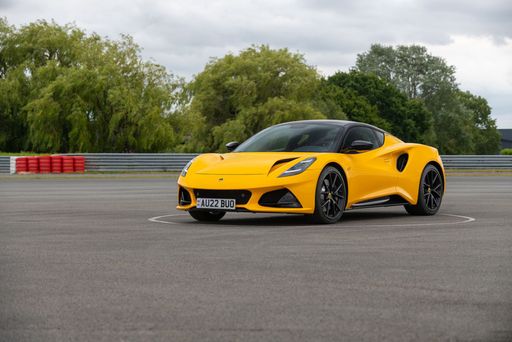Isuzu D-Max vs Lotus Emira - Differences and prices compared
Costs and Efficiency:
Price and efficiency are often the first things buyers look at. Here it becomes clear which model has the long-term edge – whether at the pump, the plug, or in purchase price.
Isuzu D-Max has a clearly advantage in terms of price – it starts at 34300 £, while the Lotus Emira costs 93800 £. That’s a price difference of around 59571 £.
Fuel consumption also shows a difference: Isuzu D-Max manages with 8.70 L and is therefore barely noticeable more efficient than the Lotus Emira with 9.20 L. The difference is about 0.50 L per 100 km.
Engine and Performance:
Under the bonnet, it becomes clear which model is tuned for sportiness and which one takes the lead when you hit the accelerator.
When it comes to engine power, the Lotus Emira has a clearly edge – offering 406 HP compared to 163 HP. That’s roughly 243 HP more horsepower.
In acceleration from 0 to 100 km/h, the Lotus Emira is significantly quicker – completing the sprint in 4 s, while the Isuzu D-Max takes 12.60 s. That’s about 8.60 s faster.
In terms of top speed, the Lotus Emira performs distinct better – reaching 291 km/h, while the Isuzu D-Max tops out at 180 km/h. The difference is around 111 km/h.
There’s also a difference in torque: Lotus Emira pulls evident stronger with 480 Nm compared to 360 Nm. That’s about 120 Nm difference.
Space and Everyday Use:
Whether family car or daily driver – which one offers more room, flexibility and comfort?
Seats: Isuzu D-Max offers significantly more seating capacity – 5 vs 2.
In curb weight, Lotus Emira is noticeable lighter – 1455 kg compared to 1905 kg. The difference is around 450 kg.
When it comes to payload, Isuzu D-Max significantly takes the win – 1095 kg compared to 290 kg. That’s a difference of about 805 kg.
Who wins the race?
The Lotus Emira proves to be outperforms in nearly all aspects and therefore becomes our DriveDuel Champion!
Lotus Emira is the better all-rounder in this comparison.
 @ Lotus Cars
@ Lotus Cars
Lotus Emira
Costs and Consumption
View detailed analysis
Engine and Performance
View detailed analysis
Dimensions and Body
View detailed analysis
Isuzu D-Max
The Isuzu D-Max wears its workhorse credentials with quiet confidence, delivering rugged practicality and a cabin that keeps things simple and sensible. If you want a dependable truck that gets on with the job without fuss—and even manages a bit of comfort on the road—the D-Max is a smart, no-nonsense pick.
detailsLotus Emira
The Lotus Emira is a supremely alive sports coupe that blends razor‑sharp handling with enough everyday comfort to make it usable beyond the track. It looks gorgeous, sounds eager and delivers a focused, smile-inducing drive that will seduce enthusiasts and tempt sensible buyers alike.
details @ Lotus Cars
@ Lotus Cars
 @ Lotus Cars
@ Lotus Cars
 @ Lotus Cars
@ Lotus Cars
 @ Lotus Cars
@ Lotus Cars
 @ Lotus Cars
@ Lotus Cars
 @ Lotus Cars
@ Lotus Cars
 @ Lotus Cars
@ Lotus Cars
|
|
|
|
|
Costs and Consumption |
|
|---|---|
|
Price
34300 - 50100 £
|
Price
93800 - 96400 £
|
|
Consumption L/100km
8.7 - 9 L
|
Consumption L/100km
9.2 - 11.3 L
|
|
Consumption kWh/100km
-
|
Consumption kWh/100km
-
|
|
Electric Range
-
|
Electric Range
-
|
|
Battery Capacity
-
|
Battery Capacity
-
|
|
co2
228 - 235 g/km
|
co2
208 - 245 g/km
|
|
Fuel tank capacity
76 L
|
Fuel tank capacity
58 L
|
Dimensions and Body |
|
|---|---|
|
Body Type
Pickup
|
Body Type
Coupe
|
|
Seats
2 - 5
|
Seats
2
|
|
Doors
2 - 4
|
Doors
2
|
|
Curb weight
1905 - 2110 kg
|
Curb weight
1455 - 1493 kg
|
|
Trunk capacity
-
|
Trunk capacity
151 L
|
|
Length
5280 - 5320 mm
|
Length
4413 mm
|
|
Width
1810 - 1870 mm
|
Width
1896 mm
|
|
Height
1770 - 1790 mm
|
Height
1235 mm
|
|
Max trunk capacity
-
|
Max trunk capacity
-
|
|
Payload
990 - 1095 kg
|
Payload
270 - 290 kg
|
Engine and Performance |
|
|---|---|
|
Engine Type
Diesel
|
Engine Type
Petrol
|
|
Transmission
Automatic
|
Transmission
Automatic, Manuel
|
|
Transmission Detail
Automatic Gearbox
|
Transmission Detail
Dual-Clutch Automatic, Manual Gearbox
|
|
Drive Type
All-Wheel Drive
|
Drive Type
Rear-Wheel Drive
|
|
Power HP
163 HP
|
Power HP
406 HP
|
|
Acceleration 0-100km/h
12.60 s
|
Acceleration 0-100km/h
4 - 4.3 s
|
|
Max Speed
180 km/h
|
Max Speed
290 - 291 km/h
|
|
Torque
360 Nm
|
Torque
420 - 480 Nm
|
|
Number of Cylinders
4
|
Number of Cylinders
4 - 6
|
|
Power kW
120 kW
|
Power kW
298 kW
|
|
Engine capacity
1898 cm3
|
Engine capacity
1991 - 3456 cm3
|
General |
|
|---|---|
|
Model Year
2024 - 2025
|
Model Year
2024
|
|
CO2 Efficiency Class
G
|
CO2 Efficiency Class
G
|
|
Brand
Isuzu
|
Brand
Lotus
|
Is the Isuzu D-Max offered with different drivetrains?
The Isuzu D-Max is offered with All-Wheel Drive.
The prices and data displayed are estimates based on German list prices and may vary by country. This information is not legally binding.
